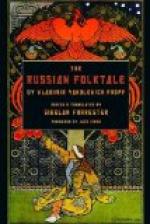Origin of fairy tales, 158-67.
Outline, 291-303.
Paper-cutting, 130-31.
Painting, as expression, 132.
Panchatantra, the Five Books, 171.
Pause, in story-telling, 104-05.
Pentamerone, The, 178-79.
Perrault, Charles,
statue of, 1;
list of tales by, 180;
tales by, tested as literary form, 68;
editions by, 257-58.
Personality,
quality of, 57-58;
in Oeyvind and Marit, 60;
in Three Billy-Goats Gruff, 64;
power of, 106-07.
Personal relation, establishment of, 107-10.
Peter Rabbit, 239.
Philosophy,
in fairy tales, 48-52;
of Uncle Remus Tales, 51-52;
of Laboulaye’s Tales, 51;
of Cat and Mouse in Partnership, 48;
of Emperor’s New Suit, 48-49;
of Ugly Duckling, 49-50;
of Elephant’s Child, 49;
child’s, 50-51.
Phonics in fairy tales, 79-81.
Pictures, list, 255.
Picture-Books, list, 254-55.
Plot,
element of fairy tale as short-story,
73-77;
structure illustrated, 76-77.
Poems, fairy, list, 255-56.
Poetic justice, 22-23.
Poetry, of teaching, 120.
Portrayal of human relations, especially with children, 24-25.
Position, of story-teller, 107.
Precision,
quality of, 57;
illustrated in: Oeyvind and Marit,
60;
Three Billy-Goats Gruff, 64.
Preparation, teacher’s,
in story-telling, 94-102;
rules for telling, 94-102.
Presentation, teacher’s,
of tale, 102-19;
training of voice, 103-04;
exercises in breathing, 104-05;
gesture, 105-06;
power of personality, 106-07;
suggestions for telling, 107-12;
establishment of personal relation, 108-10;
placing of story in concrete situation,
94-95, 110-11;
conception of child’s aim, 112;
telling of tale, 112-19;
re-creative method of story-telling, 113-17;
adaptation of fairy tales, 117-19.
Princess and Pea, 114-16.
Principles,
of selection for fairy tales, 13-89;
interests of children, 13-37;
fairy tale as literature, 37-70;
fairy tale as short-story, 70-87;
references, 87-89.
Principles,
of composition, 58-60;
of story-telling, 94;
of teaching, 119-25;
concerning instincts of children, 124-25.
Problem, a means of developing consciousness, 122-25.
Proverbs in fairy tales, 50.
Purpose, growth in child’s, 123-25.
Puss-in-Boots, 232, 275-78.
Psychological method of selecting tales, 95-96.
Quick-Running Squash, 240.
Realistic, tale, 223-28; types of, 224-28.
Reading, as expression, 127; relation of, to literature, 10-11, 127.
Reason, growth in, 6-7, 10; development of, 53-54.




